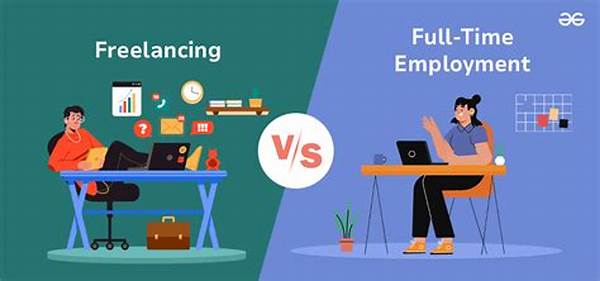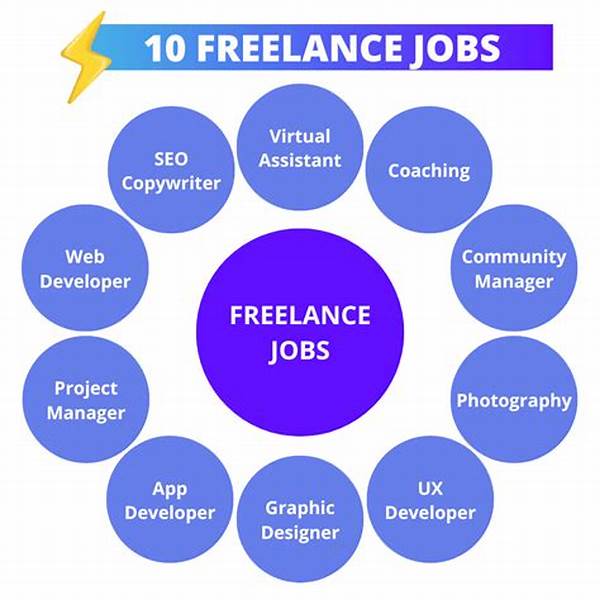
H1: Freelancing vs Full-Time Work: Which One Pays More?
Read More : Hidden Gems: How To Use Linkedin To Find Clients Who Pay Premium Project Rates!
In the ever-evolving landscape of work, the debate between freelancing and full-time employment presents a rich tapestry of opportunities, challenges, and personal preferences. Imagine being your own boss, setting your own hours, and chasing projects you’re passionate about. Now, juxtapose that with the predictability of a nine-to-five job, complete with a stable paycheck and perhaps a coffee machine that’s never quite broken—except when you really need it. As professionals strive to find their niche, a crucial factor in their decision-making process often comes down to finances. Freelancing vs full-time work: which one pays more?
The allure of freelancing lies in its promise of flexibility and autonomy. You wake up each day, knowing you control your destiny—well, as long as your clients pay on time. But freelancing isn’t just a free-for-all gig that ensures endless returns. In fact, your income could be as unpredictable as a cat’s mood swings, swayed by factors like industry demand, skillset, and your knack for networking. Conversely, full-time employment lures in many with its promise of stability: a defined salary, benefits, and, for some, the comforting hum of an office air conditioner. However, full-time workers might find themselves losing out on potential earning by not exploring side gigs or negotiating raises effectively.
The Perennial Pay Debate: Unraveling Earnings
Our exploration begins by diving into research, industry reports, and anecdotal testimonials from both freelancers and salaried employees. Humorously, it’s like comparing apples to oranges—or perhaps freelancers to tech geeks. Let’s take account of the Scenario: A report from Glassdoor or PayScale might reveal that in certain creative fields, freelancers can out-earn their full-time counterparts. Meanwhile, tech industry professionals? That’s a different story—full-time employees might chuckle their way to the bank with stock options and performance bonuses.
But what do our financial gurus say? In various studies, the results indicate that freelancing can potentially lead to a higher income—provided one is efficient, business-savvy, and not too distracted by the allure of Netflix in the background. The truth is, the financial outcomes in freelancing often correlate with one’s ability to market their skills, build a client base, and excel in project management. This income, however, comes with its own set of expenses: insurance, taxes, and don’t forget the odd desk plant that needs replacing after every motivational crisis.
H2: Analyzing Income Potential in Different Industries
Our journey doesn’t end at average salaries or potential for bonuses. No, diving deeper into various fields enables us to uncover specifics that paint a clear picture for those asking the question: “Freelancing vs full-time work which one pays more?”
—Structure: Freelancing vs Full-Time Work Income ComparisonParagraph 1: Introduction to Work Choices
Imagine you’re standing at a crossroads, one path leading to freelancing and the other to full-time work. Both promise a journey filled with opportunities, challenges, and varied levels of fulfillment. But, there’s one question that pulls you back, urging you to contemplate your decision: “Freelancing vs full-time work, which one pays more?” A simple question, yet it beckons a detailed exploration, given that both options come with differing financial dynamics, lifestyle changes, and professional development.
Paragraph 2: Setting Expectations
Both paths bring with them expectations that are as diverse as people’s tastes in pizza toppings. Freelancers thrive on their ability to adapt, to find work where it may, and often dictate their own rates. Yet, this may bring forth a cacophony of (ir)regular income streams and financial planning free-for-alls. In contrast, full-time work offers the dependable drumbeat of salary checks but may cap wage increases due to structured pay scales. So, where do we find balance?
H2: Understanding Financial ImplicationsParagraph 3: Financial Implications for Freelancers
Freelancers often wear their paycheck uncertainties like they do pajamas while attending Zoom meetings. Without a steady paycheck, they might pull their income from a mosaic of projects. Charging per project, hourly, or retaining services is just one part of the equation. For some, this results in an income potential that’s as high as your networking skills can hustle—imagine it’s more a rollercoaster than a pansy ferry ride.
H3: Income Dynamics in Full-Time WorkParagraph 4: Balancing Risk and Reward
Full-time employees may sleep soundly on their bed of anticipated payroll deposits. Knowing exactly when—and how much—they will be paid not only allows for a cushy budget but also builds a foundation that is conducive to long-term financial planning. Yet, prospects for increased income within full-time work are often governed by company policy, seniority, and unfortunately, office politics.
Paragraph 5: Long-Term Financial Considerations
While the thrill of the chase might entice freelancers with more projects, long-term financial stability often causes envy. Salaried roles with comprehensive benefits and retirement plans can offer a security blanket that freelancers sometimes need to knit themselves. However, many freelancers do find creative solutions in diversifying income streams or investing independently.
Paragraph 6: Conclusion and Personal Decision
Ultimately, deciding on freelancing vs full-time work must consider factors beyond financials: personal lifestyle choices, aspirations, and your appetite for risk. While your bank statement may look prettier in one scenario over another, consider your career goals and how each path aligns with them. As you stand at the crossroads, remember: each path offers its own unique adventures, challenges, and rewards.
—H2: Real-Life Comparisons: Examples in Freelancing vs Full-Time
Goals for Choosing Between Work Modalities
As you tread the career path, whether towards freelancing or full-time work, aligning your professional goals turns this decision into a strategic career move rather than a leap of faith. Freelancing vs full-time work: which one pays more? It’s more than just a question of salary—it’s about what you, as an individual, hope to achieve in your work life. Financial considerations are paramount, but so too are personal satisfaction, work-life balance, and future potential.
Freelancers often cherish the ability to diversify their experiences, work on projects they are genuinely passionate about, and build substantial networks across industries. They thrive on the freedom and excitement that comes with choosing varied work, often finding enrichment beyond paychecks. On the flip side, full-time employment can offer professionals a disciplined environment to grow skills steadily, offering fertile ground for career advancements with a safety net. Comprehensive benefit packages and structured career paths often follow in full-time settings. Consider both paths, weigh what matters most to you, and take your own stride towards success in the workspace landscape.
—H2: Making A Decision: Freelancing vs Full-Time?H3: Evaluating Success Metrics in Careers
Ultimately, the decision of freelancing vs full-time work intertwines with broader questions about career trajectories. What success metrics do you find most aligned with your life goals? Salary alone doesn’t make or break a career, but the model of work you choose could shape your professional journey in transformative ways.


